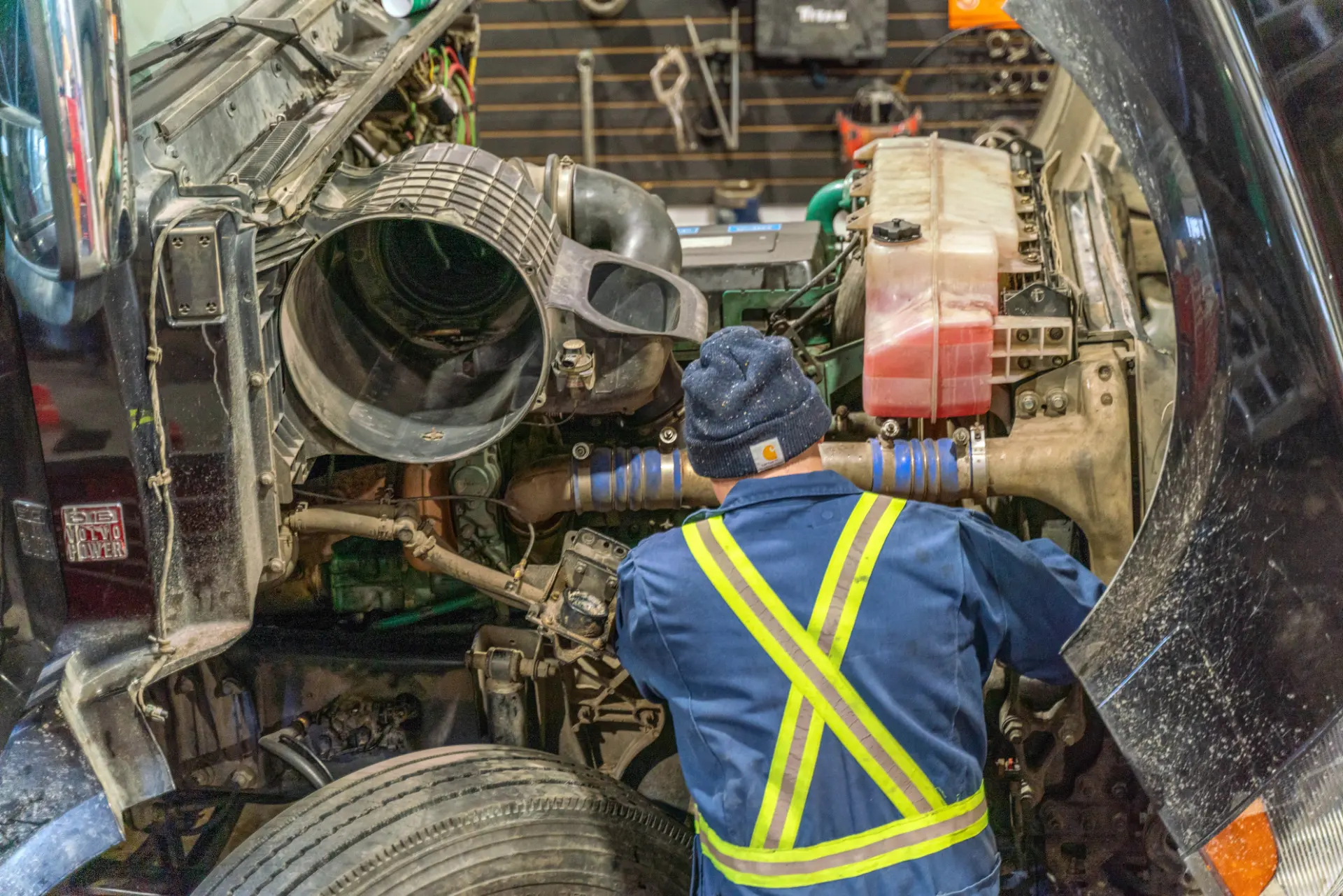Idle Time, Real Cost: How Vehicle Idling Is Draining Your Bottom Line

If you manage a fleet of commercial trucks or operate a single heavy-duty vehicle, you already know that efficiency is everything. Downtime means missed deliveries, delayed service, and lost profits. But there’s one hidden form of downtime that quietly eats away at your budget every day: vehicle idling.
Idling is the silent budget killer most fleet managers and owner-operators underestimate. Whether it's during loading, in traffic, or simply while waiting at a job site, those idle minutes add up. And while your engine is running but your wheels are not, your fuel consumption, wear and tear, and maintenance costs are steadily rising.
At Fleetgo, we understand that every second your truck is running should be contributing to productivity. That’s why we’re sharing the truth about idle time and how to get it under control. Backed by three fully-equipped, drive-through service bays and a team of experienced diesel mechanics, Fleetgo is your trusted partner for fleet service and mobile truck repairs in Edmonton and the surrounding 100-kilometer radius.
Let’s take a closer look at why idle time is draining your bottom line and what you can do about it.
What is Vehicle Idling?
Vehicle idling occurs when your truck’s engine is running but the vehicle is stationary. It might happen while:
- Waiting to load or unload
- Sitting in traffic or at red lights
- Preheating or cooling the cab
- Taking breaks between deliveries
- Running PTO equipment
Although a few minutes here and there might seem harmless, those moments multiply across multiple vehicles and days. The financial impact is far greater than most businesses realize.
The Hidden Costs of Idling
Let’s break down the different ways idle time affects your bottom line:
1. Fuel Waste
A diesel engine consumes about one to one and a half liters of fuel per hour while idling. If a truck idles for just two hours a day, that’s nearly 730 liters per year. Multiply that by current fuel prices and the number of vehicles in your fleet, and the cost becomes staggering.
Example:
- 1.3 liters/hour × 2 hours/day × 260 working days = 676 liters per year
- At $1.60/liter, that’s $1,081.60 per vehicle per year
- For a fleet of 20 trucks, that’s $21,632 per year in wasted fuel
That’s fuel you are paying for that delivers zero mileage, zero revenue, and zero value.
2. Increased Maintenance
Engines are built to drive, not idle. When trucks idle excessively:
- Engine oil degrades faster
- DPF filters clog more often
- Cooling systems wear out sooner
- Battery life shortens due to parasitic loads
This leads to more frequent service visits, more parts replacements, and more unscheduled repairs. It also decreases the resale value of the vehicle since idling increases engine hours without reflecting on the odometer.
At Fleetgo, we often see premature engine wear in high-idling vehicles that could have easily been prevented with better management and maintenance habits.
3. Environmental Compliance and Fines
More jurisdictions are introducing anti-idling regulations to reduce carbon emissions and air pollution. Companies caught violating idling bylaws may face fines or operational restrictions. Beyond the legal implications, excessive idling can damage your brand image and erode trust with environmentally conscious clients.
Why Fleets Struggle to Control Idling
The truth is, many companies don't track idle time at all. Drivers often let trucks run to maintain cabin comfort, power equipment, or simply out of habit. Without the proper tools or awareness, fleet operators lose visibility into this major cost sink.
Common reasons for idling include:
- Cold weather: Drivers keep the cab warm in winter
- Equipment operation: PTO systems require engine power
- Lack of knowledge: Drivers underestimate fuel consumption
- Scheduling delays: Trucks wait on-site longer than expected
The key to fixing it is understanding how, when, and why your trucks are idling and building systems to reduce it.
The Real Cost of Doing Nothing
Some businesses accept idling as a “necessary evil.” But inaction comes with its own set of costs:
- Reduced engine lifespan and higher depreciation
- More frequent oil changes and filter replacements
- Higher fuel bills that chip away at profitability
- Unexpected breakdowns that disrupt service schedules
And then there’s the opportunity cost. Every minute your engine runs while parked is a missed chance to optimize efficiency and protect your bottom line.
Solutions That Work: Reduce Idle Time Without Sacrificing Performance
Here’s how smart fleet operators are reducing idle time and saving money:
1. Use Idle Tracking Tools
Install telematics systems that monitor engine hours, idle time, and driver behavior. These tools provide real-time alerts and historical reports that help you identify high-idle drivers or routes.
2. Train and Incentivize Drivers
Once you have the data, educate your drivers. Show them the real costs of idling and introduce incentive programs for those who consistently reduce idle time.
3. Use Auxiliary Power Units (APUs)
Instead of running the main engine for heating or cooling, install APUs that provide power for climate control and electronics without the fuel burn or engine wear.
4. Optimize Schedules and Routes
Reduce downtime by planning more efficient routes and minimizing wait times at customer locations or loading bays. Every avoided minute of idle time adds up.
Fleetgo’s Role in Idle Reduction
At Fleetgo, we support fleet operators and owner-operators with the diagnostics and services needed to manage idle-related wear and tear before it becomes a major issue.
Our services include:
- Engine diagnostics to assess idle time impact
- DPF cleaning and replacement
- Oil and filter changes based on engine hours
- Coolant system inspection and repair
- Preventive maintenance based on real-world usage
- Mobile truck repair within a 100-kilometer radius of Edmonton
When your truck idles too much, we help bring it back to peak performance fast.
Why Choose Fleetgo?
With three drive-through service bays, a highly experienced team of diesel mechanics, and a commitment to keeping your fleet running strong, Fleetgo is the trusted partner for commercial truck repair in Edmonton.
We know how valuable uptime is. That’s why we offer:
- Quick turnarounds and transparent quotes
- On-site diagnostics and mobile repair service
- Preventive maintenance programs tailored to your fleet
- Honest advice from professionals who care about your business
It’s Time to Take Idle Time Seriously
Ignoring idle time is like leaving your wallet open on the dashboard. The costs may be quiet, but they are constant. If your trucks are idling more than necessary, your business is literally burning money.
Take control with better monitoring, smarter practices, and a team of experts on your side.
Ready to protect your fleet and boost your bottom line?
📞 Call Fleetgo today at 780-455-8131
📬 Request service or a quote at https://www.fleetgo.ca/contact
Fleetgo. Trusted. Proven. Built to keep your business moving.
More Articles

Why Vibration at Highway Speed Often Points to Driveline Problems

Why Uneven Brake Wear Signals Bigger System Issues

Early Signs of Differential Failure in Heavy-Duty Trucks
Contact FleetGo
Get in touch with Fleetgo today to request a quote or to schedule in-shop or mobile services in Edmonton & the surrounding area! Our mobile service extends to a 100km radius around Edmonton for emergency roadside assistance & mobile truck & fleet repairs, including Sherwood Park, Spruce Grove, Fort Saskatchewan, St. Albert, Stony Plain, along Highway 16, & more!


